Technology
Our technology is a novel Mode of Action using Lipid Nano Particles (LNPs) with an immune stimulating small molecule drug. This approach show a strong activation and migration of immune cells into tumor tissue a few hours after treatment, where tumor cell killing is initiated. Subsequently other immune cells are recruited to the tumor tissue and eventually stimulate tumor antigen specific responses leading to a long lasting immune memory response and complete remission of tumors.
This approach is a novel approach to use a small molecule TLR7 agonist compatible with LNPs; an approach not previously seen for TLR stimulation.
With this technology we aim to cure cancer patients suffering from metastatic disease through activation of the immune system, to build a tumor antigen specific immune response that will lead to durable control over the patients tumor.
Key benefits of the MonTa Biosciences’ technology are:
- Novel Mode of Action to recruit antitumor immune cells to the tumor tissue
- MBS8 show 20+ fold increase in Therapeutic Index over benchmark compounds compared across preclinical and clinical studies of non-LNP formulated TLR7 agonists
- MBS8 LNPs enables administration of innate immune activators with a favourable safety profile
- MBS8 is administered by IV infusion which is a major advantage for doctors and patients compared to intratumoral injection
- MBS8 is an LNP encompassing a small molecule TLR7 agonist which has undergone GMP scale up production and long term stability tests
- TLR7 is a well validated target in cancer therapy with the Aldara cream used for topical cancer
- MBS8 show superior anti-tumor activity in monotherapy over many approved therapies
- Combination with Immune Checkpoint Inhibitors, radiotherapy and chemotherapy show complete remission in preclinical models
- The CMC package for MBS8 is strong with 3 y stability and streamlined GMP production
Todays challenges in cancer treatment
The major challenges for cancer treatment today is to improve treatment and survival of patients with advanced, recurrent and metastatic disease.
The total number of patients expected to die in 2024 from cancer exceeds 500.000 in the US alone, and more than 8 million people Worldwide. More than 90 % of cancer deaths today are caused by metastatic disease.
In particular lung and pancreatic cancer patients are diagnosed late and often with metastatic disease, resulting in less than 10 % of these patients alive after 5 years. Also cancers with good 5 year survival rates like colon cancer, colorectal cancer, breast and prostate cancer are difficult to treat if the disease has progressed to the metastatic stage.
Our technology provides a solution to this challenge.
We have demonstrated the ability of our technology to raise an immune memory response that is effective in treatment of metastatic disease.

Cancer Treatment
Cancer is the leading cause of death worldwide, accounting for more than 8 million deaths annually, and this number is projected to continue rising, with an estimated 13 million deaths in 2030. In the western world one out of three people will get cancer during their lifetime, and more than one third of these patients will die from their disease. During the last decade, the 5 year survival has improved markedly for most cancers, and today there is more than 80 % chance of surviving breast, ovarian, prostate and colon cancer.
The most efficient treatment of cancer today is surgery, but often the tumor is localized at in-operable sites or has spread to distant sites called metastasis. Other treatment types includes radiotherapy, chemotherapy, small molecule drugs or therapeutic antibodies.
The technology developed by MonTa Biosciences is a type of immunotherapy that may work as single therapy, but which has also shown great synergy with other established treatments.
Development
We have Composition of Matter worldwide exclusive rights to a novel TLR7 agonist and the formulation MBS8, which is a potent stimulator of the innate immune system. Both the API and our Drug Product has been scaled in production and GMP produced in three batches so far, all showing promising 3 years stability at 4C°.
